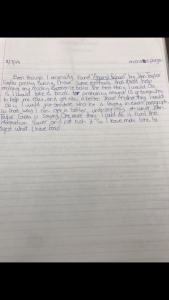Gatto
To reread the text in order to get a better understanding, I will make sure I’m in a peaceful environment because I can easily be distracted if there is too much noise (for example the TV). Furthermore, I will get rid of anything that can interfere with my reading such as my phone that I always pick up when I hear a notification. In addition of creating a better reading environment, it’s also important to really read the article. I mean actual reading not skimming or words skipping. As I read an article for the first time, usually I don’t pay enough attention to every single details especially when it’s a long text. However I aleays read more than once so I have a better understanding of the article. The second time reading is basically making sure to figure out words meaning as I read, put a dictionnary aside in case I need to check a definition. If I’m reading alone, usually I read out loud. This helps me stay more focused on the text and also improves pronounciation. Also, if i’m allowed to write on the text, I usually find myself underlining important passages, keys words and citations. This will help later on with explaining the text or answering questions related to the text. The overall “reread” for me is always the most effective way of understanding an article. As long as there is nothing bothering, a peacefull environment will help with a better understanding of the topic.




